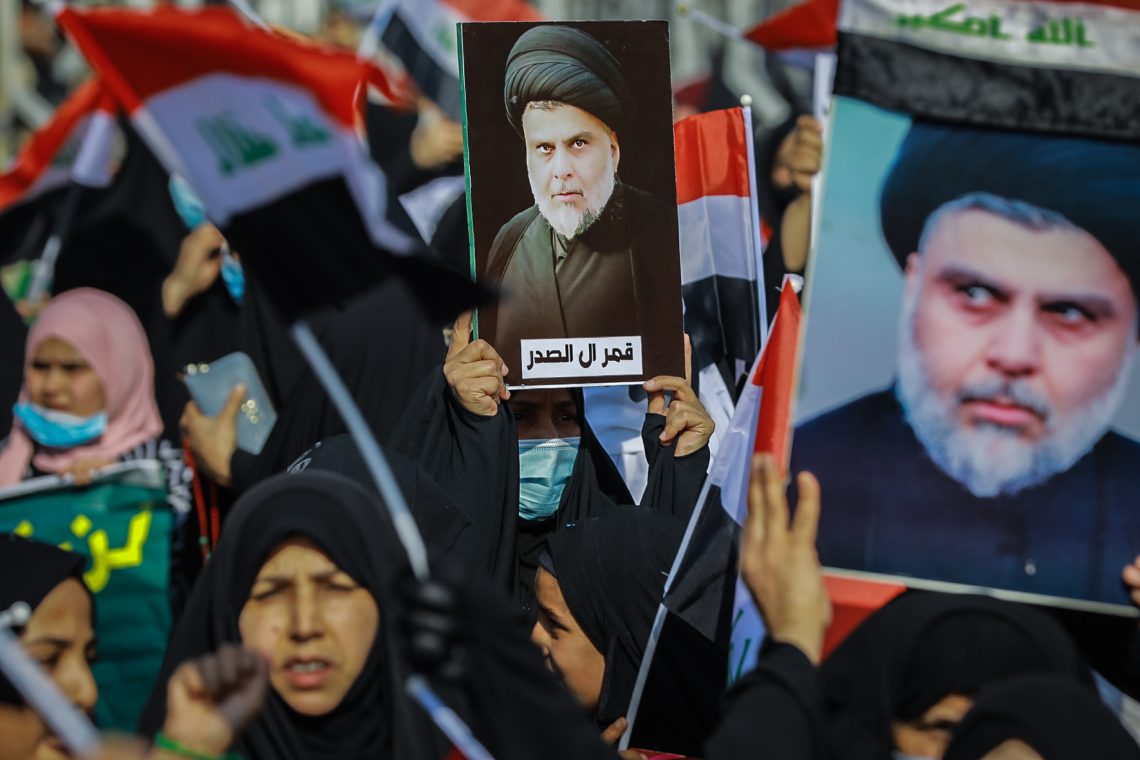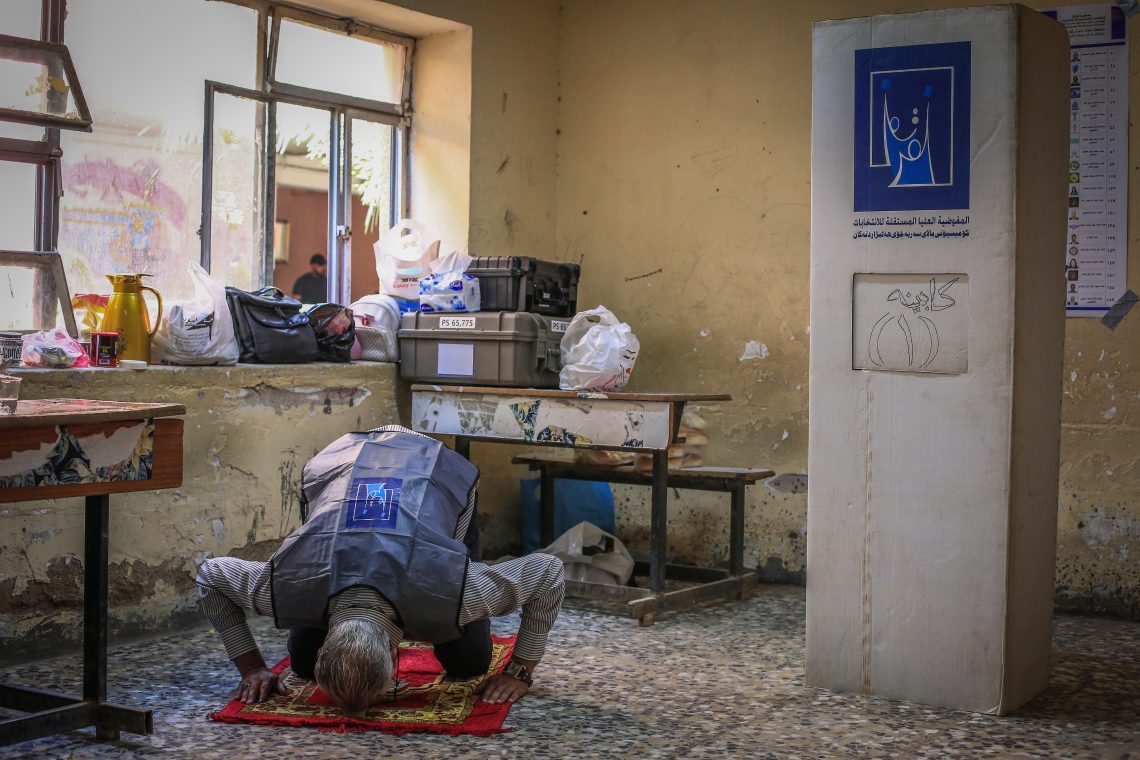Who is Muqtada al-Sadr? Part 2: Confronting Iran
Iraq’s ongoing political crisis pits the firebrand Shia militia leader against both domestic rivals and the regime in Tehran.

In a nutshell
- Sadrist candidates won a plurality in Iraq’s last election
- The country’s factions remain in gridlock
- Mass protests are likely to again erupt
This report is the second in a two-part series from GIS Expert Prof. Dr. Amatzia Baram. The first part, which published yesterday, focused on Muqtada al-Sadr’s political and ideological development.
For nearly two decades, Iran has sought to deepen its influence over Iraq’s affairs by exploiting the instability there. By 2021 it had scored substantial success. But if the current political crisis in Baghdad proves to be a hinge point in relations with Iran, it will be largely thanks to Muqtada al-Sadr, the Shia cleric and militia leader who has played a central role in its recent history.
Mr. Sadr’s open confrontation with Iran began in July 2017, when he visited Saudi Arabia with great fanfare. Tehran was not pleased. The summer of 2018 saw another key event: mass demonstrations in southern Iraq against the regime’s corruption and Iran’s exploitation of the country. For the first time, it became a Shia struggle against a Shia ruling elite, a dynamic that has persisted until today.
Both Mr. Sadr and Iraq’s Grand Ayatollah Ali al-Sistani supported the demonstrators, even though the former’s followers included members of the ruling elite. After almost two years of civil unrest, by May 2020 the new prime minister, Mustafa al-Kadhimi, had announced his support of the protestors’ demands: new electoral legislation, new elections, an anti-corruption campaign and an end to independent armed militias. Both Messrs. Sistani and Sadr, together with Iraq’s Kurdish president, Barham Salih, backed the prime minister all the way. Ultimately, he managed to change the electoral law and conduct democratic elections, but failed to achieve his other goals.
Electoral victory?
In the early elections held in October 2021, politicians loyal to Mr. Sadr won 73 seats out of 329 in parliament – making him leader of the largest party and kingmaker. He again sought to split the Shia camp and build an all-Iraqi coalition, including most Sunni and Kurdish representatives, and managed to secure a borderline majority in parliament. He declared that his nemesis – ex-prime minister Nouri al-Maliki, Iran’s main supporter in Iraq – would never be part of his ruling coalition.
This step meant that the largest pro-Iranian party would be excluded from Iraq’s government, and that Iran would lose a favorable majority in parliament. For Tehran, this was a looming disaster; it might still exert control over Iraq through the 160,000-strong pro-Iranian militias, but it could not afford losing the democratic legitimacy that came from parliamentary dominance.
In a brilliant move, the Iranian regime convinced its man heading the Supreme Judicial Council, Faiq Zaidan, to issue an unconstitutional rule stipulating that no new president can be elected without a two-thirds quorum in parliament. Constitutionally, only a new president can nominate a new prime minister. And with Muqtada al-Sadr unable to cobble together a two-thirds quorum, the democratic process was frozen solid.
Though surrounded by a million supporters, since 2003 Muqtada al-Sadr has been a lonely man.
As has happened a few times before, beginning June 11, 2022, Mr. Sadr went into an emotional frenzy lasting over six weeks. Instead of using the simple majority that he still retained to dissolve parliament, he ordered all of his 73 delegates to resign, hoping to both delegitimize the legislature and reenergize his base of support. He also believed that his Kurdish and Sunni allies would also resign, but they did not.
But by ordering his party parliamentarians to resign, he gave a majority to his archenemy, Nouri al-Maliki. The latter immediately found a candidate for the premiership, though he, too, lacked a two-thirds quorum to first elect a new president.
Muqtada al-Sadr again lashed out. On July 27, he declared a “revolution” against the sectarian governmental system that was introduced after 2003, and ordered his supporters to storm parliament – and subsequently to evacuate it, to occupy it again, and finally to besiege the Supreme Judicial Council. The latter siege lost him much domestic and foreign support. He later sent an appeal to the same body to disperse parliament and call for new elections, which the Council rejected; constitutionally, only parliament can disperse itself.
Humiliation
This is when Iran dealt Mr. Sadr a humiliating blow. On August 28, his official religious “source of emulation” (muqallad), Grand Ayatollah Kadhim Husayni al-Haeri, resigned from all religious leadership duties – apparently on the orders of Iranian Supreme Leader Ali Khamenei.
Such a resignation is an extremely rare act in Shia tradition: an ayatollah is muqallad for life. To add insult to injury, Ayatollah al-Haeri sent Mr. Sadr a public and highly offensive letter, reminding him just how insignificant of a cleric he was. Most embarrassingly, he called upon all of his Iraqi followers (which include most of Mr. Sadr’s supporters) to follow Iran’s Supreme Leader from then on.

As a reaction to this profound affront from Iran and his mentor, and with a sense that he has hit a brick wall, Muqtada al-Sadr again flew into a rage. On August 29, he announced – for the fourth or fifth time – his resignation from political life. He once more demanded the dissolution of parliament, but in an escalation, also demanded that all Iraqi senior politicians also resign from politics.
His supporters viewed these as marching orders. They occupied the government palace, and all over Baghdad began challenging pro-Iranian militias. The highly dangerous, pro-Iranian group Asa’ib Ahl al-Haq quickly opened fire. No fewer than 30 people were killed, almost all of them Mr. Sadr’s men.
Prime Minister al-Kadhimi ordered a full curfew in Iraqi cities, while security forces tried to separate the warring sides. On August 30 – with the casualties piling up and after receiving a quiet demand from Ayatollah al-Sistani to evacuate Baghdad’s Green Zone and end the violence – Mr. Sadr denounced both his own side and the other. He praised the prime minister for not unduly involving state security, ordered his supporters to evacuate the Green Zone within the hour, and urged all involved to stop the fighting. While tensions remained as high as the August heat of 52 degrees Celsius, his words cooled everybody off.
Scenarios
Though surrounded by a million supporters, since 2003 Muqtada al-Sadr has been a lonely man. The Shia intellectual and political elite, such as the Islamic Dawa Party, have had little respect for him or his supporters. The anti-regime and anti-Iranian demonstrators cannot trust him, because his men harassed them in 2019-2020 for no reason. Since he ordered his lawmakers to resign, his Kurdish and Sunni allies, the prime minister, the president, and the marja’iyya (religious leadership) of Najaf – while all sympathetic – are worried about his decision-making style and predisposition for violence.
Mr. Sadr has no consigliere to make him pause and listen in a moment of anger. After past major crises, he has resigned and then bounced back. This is again the case today: he will be back. But if he desists from political activity for a few months, it will serve the parliament and Iraqi politics on a silver platter to Nouri al-Maliki and Iran. Alternatively, Mr. Sadr can send his people back to the streets, which could also spark a civil war.
While parliament is now widely seen as illegitimate, following the resignation of Mr. Sadr’s lawmakers, even a problematic parliament can serve Iran’s needs. Interim President Barham Salih is therefore supporting Mr. Sadr’s call for new elections. Mr. Salih is highly respected, but this is not enough. Now that the high court has decided against interference, the one person who can save Iraq from the present crisis without subjugating the country to Iran is Grand Ayatollah al-Sistani – who, for the last few months, has kept himself above the fray.
Mr. Sistani favors the fight against corruption and against Iran’s domination of Iraq’s politics, security and economy. Yet, contrary to the Iranian concept that the senior cleric should rule, he does not want to get involved in politics. He seems reluctant to return to the role of political arbiter that he played in 2019-2020.
However, if Ayatollah Ali al-Sistani believes that most Iraqis (or, at least, most Iraqi Shias) want him to intervene, he will. So far, his actions have appeared somewhat contradictory. On one hand, he quietly demanded that Mr. Sadr end all violence. On the other, he and his Najaf colleagues have gently signaled support for the junior Iraqi cleric’s cause, by sending senior representatives to a ceremony mourning the dead Sadrist soldiers and denouncing the killings. But that modest signal was all.
Mr. Sistani’s inclination is to call for new elections – but he faces the dilemma that constitutionally, the parliament is still legitimate. Calling for its dissolution will also alienate Iran and its powerful militias. More likely, therefore, unless Iraq explodes into violent riots, or unless there emerges a constitutional way to dissolve parliament, the Ayatollah will keep his silence.
Still, because too many young Iraqis want to see Iran’s exit, major political reform and new elections, calm is not likely. Peaceful mass protests are very likely to erupt again, as they did most impressively in October 2019 – and the pro-Iranian militias know how to shoot. Muqtada al-Sadr’s mistakes greatly weakened the protesters, as well as his Kurdish and Sunni allies.
Indeed, these two groups of allies are in a bind. If they betray Mr. Sadr and join the pro-Iranian camp, he will never forgive them, and they will be blamed for turning Iraq into Tehran’s vassal. If they stick with Mr. Sadr much longer, the political crisis will become extremely dangerous.
They could solve their dilemma in two stages. First, by agreeing on a president, who must be Kurdish. The two main Kurdish parties are on both sides of the parliamentary divide and, so far, cannot agree on a single candidate. Second, the pro-al-Sadr Kurds and Sunnis may be able to force the pro-Iranian politicians to agree that a new prime minister will declare early elections. If the pro-Iranians prove unyielding, Mr. Sistani’s support for such a step could then be decisive.
As for Western aims, the path to lifting Iran’s grip on Iraq starts with supporting new elections. Muqtada al-Sadr is a dangerous actor, and helping him means riding a tiger. Still, to achieve that goal, Western powers and Arab states would first have to help the woefully divided Iraqi demonstrators organize ahead of the next elections. Then they must ensure that the ballot is a democratic one. Tehran is certain to act in the opposite direction.








